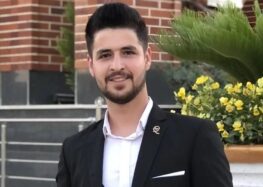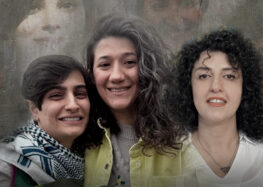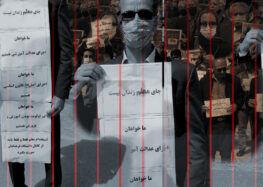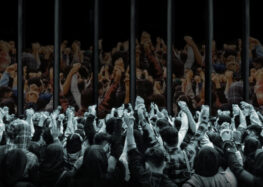Mother of Slain Protestor: “Why Did They Shoot at My Son’s Head?”
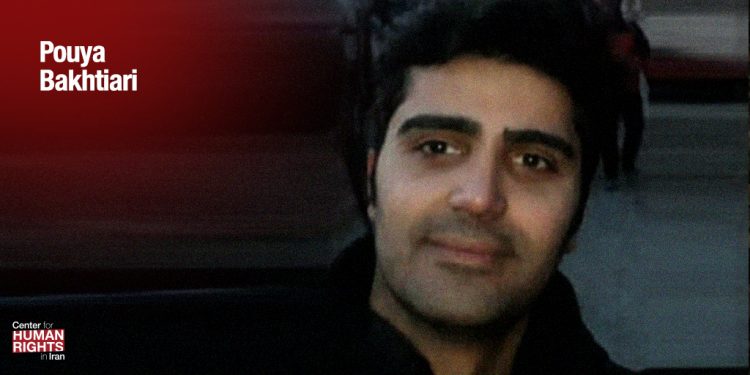
“My son was only defending the rights of his people”
The family of Pouya Bakhtiari, a 27-year-old man shot and killed by security forces in the Mehrshahr district of Karaj, west of the capital Tehran, on November 16, 2019, during the recent protests that gripped Iran, will seek justice through domestic and international channels, his mother told the Center for Human Rights in Iran (CHRI).
“They aimed at my son’s head and deliberately killed him,” Nahid Shirpisheh said in an interview on December 3.
Pouya’s killing was one of hundreds in the state’s violent crushing of the protests that erupted across Iran after the government’s November 15 announcement of a sharp gas price hike. The security forces fired live ammunition into crowds of unarmed civilians. The UN has stated that over 200 hundred protestors were killed, and that the number may rise significantly, and over 7000 were arrested.
“If they had a problem with the protests and wanted to disperse the crowds, they could have used tear gas or fired bullets into the air. They could have at least shot him in the leg. Why did they shoot at my son’s head? Did they have the right to disperse a crowd by taking away a human being’s life? Who gave them that right?”
Earlier Pouya’s father, Manouchehr Bakhtiari, had told CHRI that he would file a complaint with judicial authorities demanding the identification of the person responsible for the killing of his son.
Pouya had gone to the protest with his mother and died a few hours later after being taken to the hospital with a bullet wound to his head.
“My son had come home from work tired and hungry, but he didn’t take a rest,” Shirpisheh said regarding the day he was killed. “He told me there was a disturbance outside. He was very happy and cheerful about it. I was happy, too, because as his mother, I felt the same way about what was happening. Pouya asked me to go outside with him.
“I put on some warm clothes, took my son’s hand and we got out of the house. I told him we were going out there on the condition that we would not let go of our hands. I knew what could happen in these protests and disturbances. We chanted slogans and walked along with the people.
“When they fired tear gas at us, my eyes started to burn and we got separated in the chaos. That’s when I almost lost Pouya but he called me and asked where I was. I told him he shouldn’t worry; I was there. I joined with Pouya’s sister at the protest and chanted loudly against this dictatorship.
“Under the guise of an Islamic Republic, this bullying, treacherous regime has suppressed the people and sucked their blood in the name of Islam. They have plundered the country’s wealth and committed treason against the people. My son and I were protesting because we were tired of this 40-year-old dictatorship. We raised our voice and shouted: ‘Death to the dictator.’”
Shirpisheh, who is a school teacher, added: “I wasn’t afraid at all about my cultural and professional position. I was just happy that I could play a role worthy of a free human being. I was a little bit behind Pouya and all I could do was chant slogans. Some 50 to 100 meters ahead of me, my son, as a free man, had closed the freeway and forced the security forces to back off.
“The people were marching ahead with empty hands but I did see some who were throwing rocks at the security forces and trying to push back the armed special units. That night, for 10 or 15 minutes, I thought something beautiful was happening. I felt finally something positive was taking place to change society. I told my daughter, ‘Can you believe this is the most beautiful night of my life?’
“Ten minutes later I saw my son being carried by the people. We took him to the hospital and he died right there. He became a martyr. He gave his blood for his country.”
Pouya’s mother continued: “My son didn’t have a problem making a living. The increase in the price of gasoline didn’t affect his or our life in any way. My son was only defending the rights of his people. He was aware of what he was doing and achieved his wish with open eyes. He played his role for his country and the people honorably.
“My son had taken a big risk by being present in such a large disturbance. He was risking his life without any fear. He courageously and gallantly went forward knowing the danger ahead. Anything could have happened…
“Suddenly I saw a wave of people coming toward me, chanting ‘I will kill those who killed my brother.’ I looked closer at the face of the young man they were carrying and noticed he was my son. To make sure, I looked at his shoes and clothes. I recognized my son. I knew for sure I was the mother of a hero.”
Shirpisheh said she witnessed other people who had been shot as well.
“I thought the bullets were not real and therefore if any of us got injured, it wouldn’t be a problem. But to my surprise, the bullets were real and they shot my son in the head, which means they deliberately aimed [to kill]. There cannot be any other reason. They were given orders from above to fire bullets but they had no right to do so. Ninety percent of the people who died in the recent protests were shot in the head. This proves there was deliberate intention…
“They took my son to be seen by a doctor at the hospital. I wanted to be next to him in that situation but they wouldn’t let me go inside where he was being treated. As I was waiting for my son to come out of the operating room, I was told he had died. I was so enraged at my son’s killers that I started chanting slogans aloud. No one tried to stop me because they knew I was a mother in pain.
“At that point I shouted ‘death to the person who thinks he’s the leader and protector of this nation.’ It was hard to accept my son’s death; the son whose hand I had been holding in my hand just a few hours earlier.
“As a responsible human being, my son had been filming and posting what had been happening. That showed his character. He was not a rioter or agitator. He just couldn’t tolerate this 40-year-old tyranny anymore.
“When Pouya died, I thought I couldn’t live with the pain. But the night before his funeral I went to his room and slept on his bed. I held his blanket in my hand and started talking to him. I told him, ‘My dear Pouya, tomorrow will be a difficult and bitter day for me. Help me go through the burial ceremony…’ It was a real miracle that God gave me the strength to be at my son’s burial ceremony with grace and pride and witness his soul rising to the skies.
“Now Pouya’s ideals are mine. I started on this path holding his hand in mine. He lost his life when his blood was spilt but out of respect for his soul and his ideals, I will continue on this path as his mother as long as I’m alive. I think if I don’t do that I won’t be a good mother.”
Shirpisheh added: “My purpose in going on with life is to find my son’s killers. Then I want to see the punishment of the person who ordered the killing of Pouya and other Pouyas in such an atrocious manner. I want to witness and celebrate the freedom of the people of Iran.
“We will definitely lodge a complaint with the court in the judicial system inside the country and seek justice from international organizations for the killing of my innocent son. We want to let the world know about the tragedy that has befallen our family and make sure those responsible will be punished.
“My innocent son was killed by this corrupt regime; this tyrannical, criminal, treacherous regime that deserves every bad name you can think of. Unfortunately, we are living under this regime in these circumstances. My Pouya suffered a lot not because he lacked a comfortable life, but because he wanted to save the people from this tyrannical dictatorship….”
The UN High Commissioner for Human Rights, Michelle Bachelet, issued a statement on December 6 describing the violent state response to the protests in Iran as “an indiscriminate, horrifying and deadly reaction by the security forces” and that the killings were “clear violations of international norms and standards on the use of force.” Bachelet stated that “those responsible must be held accountable.”



